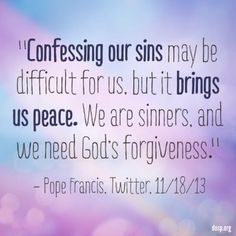This one has taken me a while to put together. Because confession proved to be a more difficult thing to work through than I thought it would be. Specifically, it’s necessity for Catholics, and lack of necessity for Protestants due to their lack of access to the sacrament, among other things.
In general, the idea of needing to go “through” a priest is very aversive to Protestants. The main argument here is that you can go directly to God with anything. You don’t need a go-between.
Also, widespread belief in Protestantism is that once you are ‘saved,’ or accept Christianity’s teachings on who Jesus was and his redeeming role for mankind, then your sins are forgiven. Past, present, and future ones.
A result of that is we don’t think about our sins all that much. Our church does have a time of common confession, where there is a few moments of silence to reflect on our sins, then to be reminded of God’s forgiveness. But it’s really easy to let that moment pass without seriously reflecting on your sins. Like in the Mass, or any church service, you can go through the motions without engaging your heart.

Here is where the Sacrament of Reconciliation started to make sense to me. This belief Protestants have that all past present and future sins are forgiven doesn’t really jive with the Lord’s Prayer that we all pray so often, where we ask God to forgive our sins. Also, the time of public (private) confession in the church service.Which is hard to reconcile with the past, present and future sin forgiveness at the time of conversion that is common belief. Both those things seem to indicate that at some level, continual confession of our sins is good, necessary even. But to what end?
We don’t even often, or ever, “count” our sins, per say. It’s more of a general acknowledgement of our need for God’s forgiveness. So the idea of going to a first confession in the Catholic church, and needing to try and remember things I’ve done and privately asked God for forgiveness for still didn’t make a lot of sense to me early on.
So here are some of the other pieces of the puzzle that reconciled me peacefully to the idea of reconciliation.
Church History. What was the early church doing? How did they practice confession? Thanks to a friend I was pointed in the direction of a helpful website, which listed numerous early church documents that referred to the practice of confession. This is only one of them:
“[Regarding confession, some] flee from this work as being an exposure of themselves, or they put it off from day to day. I presume they are more mindful of modesty than of salvation, like those who contract a disease in the more shameful parts of the body and shun making themselves known to the physicians; and thus they perish along with their own bashfulness” (Repentance 10:1 [A.D. 203]).
See here for more.
In everything else, we consult historical sources to help us gain insight in interpreting texts. I am no longer hesitant to do that with the Bible and the Early Church (See my thoughts on Sola Scripture here). I think it is wise to look at other texts that might help us get an insight into the time and culture in which our faith had its beginnings.
The concept of sin. Sin makes our souls sick. I think this is a concept almost anyone of any background could at the very least understand. Everyone knows what happened to Ebeneezer Scrooge’s heart due to his selfishness and greed. We all know the Grinch. Beauty and the Beast. Let selfishness, bitterness, anger, pride, or any number of things take over in our life and we become ugly.
The Catholic concept is that all sin hurts our souls. Some more than others. Venial sins aren’t good, but they aren’t a death blow. Mortal sins are so serious that it inflicts a potentially deadly wound.
In short, sin is serious business.
As Christians, we have a call to live higher- to be selfless, loving, trustworthy, faithful, patient, kind, etc. We can’t be those things while crippling ourselves with selfishness, hate, anger, greed, rudeness, etc.
In Persona Christi So I agree. The Early Church practiced confession. Even Protestant churches, though rather non-specifically at times practice confession still today. So there is probably something to the idea of it. I also agree sin is serious and bad for me in my pursuit to live more like Christ each day.
Which brings me to… Protestant Christians are all about talking directly to God, so why need a priest? Well, the Catholic Church is all about the idea of taking a spiritual reality and giving us something physical to hold onto to represent what is happening on the spiritual level. Confession is no different.
The priest, during confession, acting in the person of Christ actually isn’t that difficult for me to understand. In my circle, we frequently talk about needing to be the “hands and feet” of Jesus in this world we live in. When I go do the ministry I am a part of, I hope people will see Jesus through my interaction with them. In essence, and much more informally than a priest, I am hoping to be In Persona Christi daily as I interact with everyone I meet. So the idea of the priest acting in the person of Christ for my encounter with God through confession logically holds to many beliefs I am already practicing.
Instead of looking up into the air and asking God to forgive me my sins, which can sometimes be so difficult because as humans we want something tangible to hold onto, I would have the opportunity in Confession to look in the eyes of someone who is acting as Jesus. Instead of hoping to feel or understand that I am forgiven on my own, I can hear an actual voice speak to me that it is true. I could see that being a very powerful experience.
I’ve been hearing the words “both, and” in reference to Catholicism a lot. Yes, we can pray directly to God, and should and need to. And yes, we do need the Sacraments because we are physical beings and those physical, tangible representations of the spiritual reality of receiving God’s grace are immensely valuable to us. And if you have access to that beautiful gift, you should use it!

Moving forward. I don’t have to have this all perfectly understood to move on. A life lived in faith of any kind is a journey and a process and I think something you grow into as your understanding and experience develop. But I’ve come a long way since I started this inquiry into this particular sacrament.
I think I will be nervous leading up to my first Confession. I know I will hear words full of grace at the end of it, but the idea of telling my worst moments as a person and the darkest parts of who I am to God through this sacrament is still scary.To say ones sins out loud, to another person, I imagine, changes things. I experience a sort of repulsion to the idea of thinking about the ways in which I am not a good person. The ways in which I hurt others or myself through my thoughts and actions. And some part of us, like Adam and Eve, thinks that if we just stay hidden in the bushes that God won’t know what we’ve done. Going to Confession rids us of the ability to lie to ourselves in that way.
Still, how can we possibly be truly ourselves and stand in the presence of the holiness that is God and live? Interestingly and obviously, God knows all those parts of me anyway, and here I am, alive. So. much. grace. I can’t even comprehend it in my mind. And I think the Sacrament of Reconciliation makes that grace tangible, in a beautiful and wonderful way.
And I think an official examination of my conscience is in my near future.
Thanks for you thoughts and insights. I agree wholeheartedly in the value of regular and formal confession. In reference to 12 Step programs again, cleaning house is a crucial part of recovery. Sins are referred to as “character defects” and they can destroy us if they’re not swiftly brought before our creator. This is typically done in an initial “5th Step” and for folks who truly work a recovery program, there is a continual rigorous effort to keep the garden “free of weeds” so to speak. When one comes up, we need an honest self-assessment. There’s no room for shyness as secrets will indeed destroy is. Then it’s brought into the light quickly as action is taken to share the issue with another person, and to ask for God’s help so as not to keep repeating the behavior. And these “helpers” aren’t trained in any way but the practice is undeniably life changing. It’s very similar to confession when you think about it. It’s a practice I’ve engaged in for a good many years. I see folks in recovery who do not work these steps thoroughly. Their lives look quite different than the lives of folks who work the steps diligently. Cleaning house is a crucial part of living a peaceful life. A life where we put God’s will first. And when we “get in the way” and act on our sinful nature we take heed and address the issue swiftly. Then (in accordance with my faith) the devil lacks the ability to get a foothold. But confessing on my own isn’t enough according to recovery principals. Without guidance from someone else, my twisted thinking can easily strive to overrule the voice of reason. I can’t imagine my life without this practice and I truly believe it can benefit everyone to come before God in this manner, with another human being. That said, isn’t it funny that I’ve struggled with the Catholic practice of confession? How very silly of me.
LikeLiked by 1 person